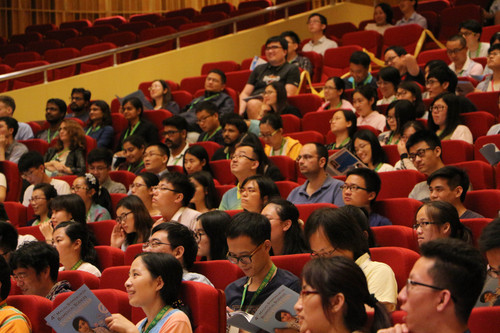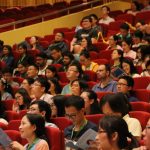 Well-known experts gather at UM to discuss new technologies in cancer treatment.
Well-known experts gather at UM to discuss new technologies in cancer treatment.
The Fourth Macao Symposium on Biomedical Sciences, organised by the University of Macau (UM) Faculty of Health Sciences (FHS), opened at UM today (21 June). Nearly 300 experts, researchers, faculty and students in the field of biomedical sciences from around the world attended the symposium. Participants held in-depth discussions on the major new technologies and cutting-edge research in the field and explored opportunities for research collaboration.
Officiating guests at the symposium included Cheang Kun Wai, member of the Administrative Committee of the Science and Technology Development Fund; Lei Chin Ion, director of the Health Bureau; Ma Hok Cheung, president of Kiang Wu Hospital; Lou Pak Sang, deputy director of the Education and Youth Affairs Bureau; Lam Kam Seng, chair of UM’s University Council; Rui Martins, acting rector of UM; and Chuxia Deng, dean of UM’s FHS.
In his speech, Martins said that the new campus provided ample opportunities for developing UM into a better education hub. He added that over the past decade, the university has transformed from a small community university to an advanced world-class university with unique regional characteristics. Such transformation requires countless innovations. The university also strives to become an important research hub in the region. On the new campus, there is a research base with six research buildings, including two state key laboratories: one in microelectronics and the other in Chinese medicine. UM expects this research base to foster scientific discoveries and promote technological development, which will in turn lead to possible incubation for technology transfer and innovative industries.
Chuxia Deng said in his speech that the symposium was initiated in 2014 by the FHS. Over the past three years, with the strong support of UM’s leadership, the FHS has developed significantly in various areas. Currently it has over 300 scientists, including 35 faculty members, about 180 doctoral students, and 112 postdoctoral fellows and Research Assistants. The faculty is now a major force in biomedical science research in Macao. He added that the symposium has also grown significantly, from 6 speakers and less than 50 participants in the beginning to approximately 22 speakers, 132 poster presentations, and over 300 participants today.
The theme of this year’s symposium is ‘innovation’. The topics discussed at the symposium include diagnostic imaging and drug delivery, cancer immunology, translational trial and personalised cancer therapy, tumor microenvironment and metastasis, metabolism, signaling networks and therapeutics, developmental induction, and new technologies in biomedical sciences. Well-known scholars in the field attended the symposium and delivered speeches. They included Prof Matthew Fisher from the University of California, Santa Barbara; Deputy Director Qian Chaonan and Prof Zhu Xiaofeng of the Sun Yat-Sen University Cancer Center; Prof Dong-Ki Lee from Sungkyunkwan University; Prof Chan Chi-Fung from the University of Hong Kong; and professors Liu Tzu-Ming, Lee Tsz On, and Poon Chuen Wai from UM.
Tomorrow, participants will discuss topics related to precision medicine and tumour markers. Experts in precision medicine will deliver keynote speeches. Prof Nai-Kong Cheung from the Memorial Sloan-Kettering Cancer Center will give a speech on using bispecific antibodies in the diagnosis and treatment of cancer. He will discuss how the antibiotics he has spent decades developing kill cancer cells in a more powerful way as well as new breakthroughs in cancer therapies.
The First Macao Symposium on Biomedical Sciences was held in 2014. This is the fourth edition of the event. Every year, the organiser invites leading scholars from around the world to share their latest research findings in the field. The event aims to promote innovation in biomedical sciences by enhancing communication and collaboration among scholars and researchers.


